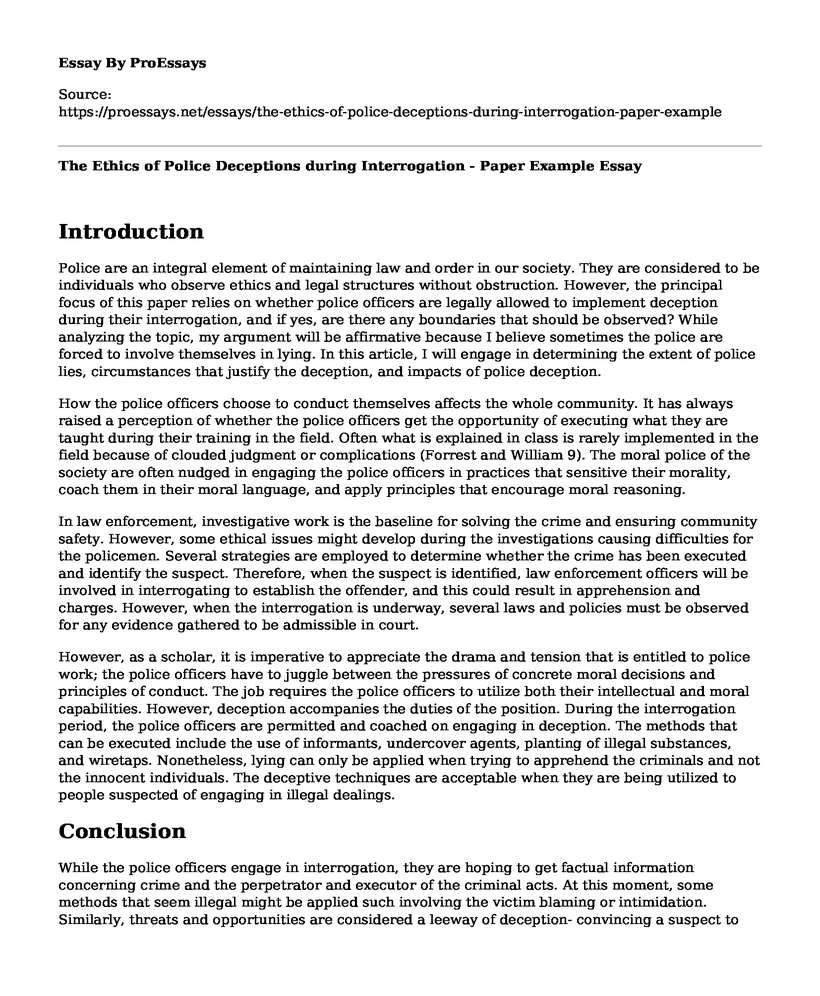Introduction
Police are an integral element of maintaining law and order in our society. They are considered to be individuals who observe ethics and legal structures without obstruction. However, the principal focus of this paper relies on whether police officers are legally allowed to implement deception during their interrogation, and if yes, are there any boundaries that should be observed? While analyzing the topic, my argument will be affirmative because I believe sometimes the police are forced to involve themselves in lying. In this article, I will engage in determining the extent of police lies, circumstances that justify the deception, and impacts of police deception.
How the police officers choose to conduct themselves affects the whole community. It has always raised a perception of whether the police officers get the opportunity of executing what they are taught during their training in the field. Often what is explained in class is rarely implemented in the field because of clouded judgment or complications (Forrest and William 9). The moral police of the society are often nudged in engaging the police officers in practices that sensitive their morality, coach them in their moral language, and apply principles that encourage moral reasoning.
In law enforcement, investigative work is the baseline for solving the crime and ensuring community safety. However, some ethical issues might develop during the investigations causing difficulties for the policemen. Several strategies are employed to determine whether the crime has been executed and identify the suspect. Therefore, when the suspect is identified, law enforcement officers will be involved in interrogating to establish the offender, and this could result in apprehension and charges. However, when the interrogation is underway, several laws and policies must be observed for any evidence gathered to be admissible in court.
However, as a scholar, it is imperative to appreciate the drama and tension that is entitled to police work; the police officers have to juggle between the pressures of concrete moral decisions and principles of conduct. The job requires the police officers to utilize both their intellectual and moral capabilities. However, deception accompanies the duties of the position. During the interrogation period, the police officers are permitted and coached on engaging in deception. The methods that can be executed include the use of informants, undercover agents, planting of illegal substances, and wiretaps. Nonetheless, lying can only be applied when trying to apprehend the criminals and not the innocent individuals. The deceptive techniques are acceptable when they are being utilized to people suspected of engaging in illegal dealings.
Conclusion
While the police officers engage in interrogation, they are hoping to get factual information concerning crime and the perpetrator and executor of the criminal acts. At this moment, some methods that seem illegal might be applied such involving the victim blaming or intimidation. Similarly, threats and opportunities are considered a leeway of deception- convincing a suspect to less jail time if they confess to crimes (Hartwig, Timothy, and Michael 326). Despite some methods being illegal, the police force depends on opportunities seized. Thus, the police officers exist in a world where morally right and morally wrong can be accepted depending on the circumstances. Some deception will provide exceptional results. Law enforcement officers are not expected to offer truthfulness to criminals. Regardless of deception being considered as immoral; deception remains justified depending on what the deceived believes, and whether the deceiver's credibility remains strong.
Works Cited
Forrest, Krista D., and William Douglas Woody. "Police Deception during Interrogation and Its Surprising Influence on Jurors' Perceptions of Confession Evidence." Jury Expert 22 (2010): 9.
Hartwig, Maria, Timothy J. Luke, and Michael Skerker. "Ethical perspectives on interrogation." The Routledge Handbook of Criminal Justice Ethics (2016): 326.
Cite this page
The Ethics of Police Deceptions during Interrogation - Paper Example. (2022, May 22). Retrieved from https://proessays.net/essays/the-ethics-of-police-deceptions-during-interrogation-paper-example
If you are the original author of this essay and no longer wish to have it published on the ProEssays website, please click below to request its removal:
- Why Are Conservatives Trying to Destroy the Voting Rights Act?
- Ethics of Police Deception During Interrogation Annotated Bibliography
- Departmental Project: Strategic Plan
- Introduction to Criminalistics - Essay Sample
- Essay Sample on Criminal Justice System with Reference to Privatization
- Essay on U.S. Judicial System: Ensuring People Obey Laws & Eliminating Conflicts
- Paper Example on Real Estate Appraisal Reports: Aligning With Logic & Standards







